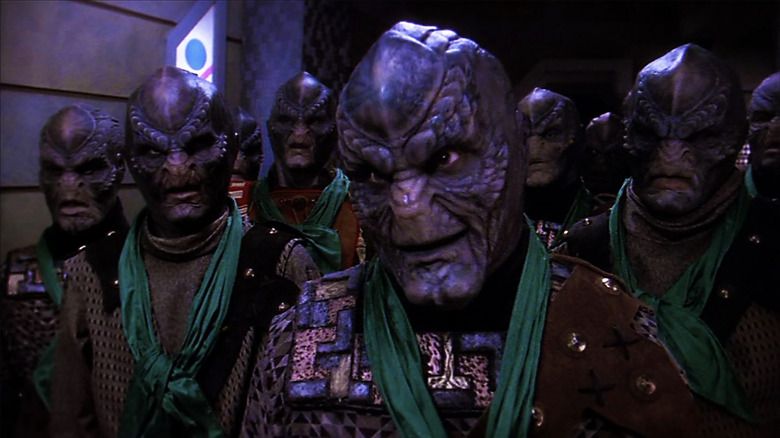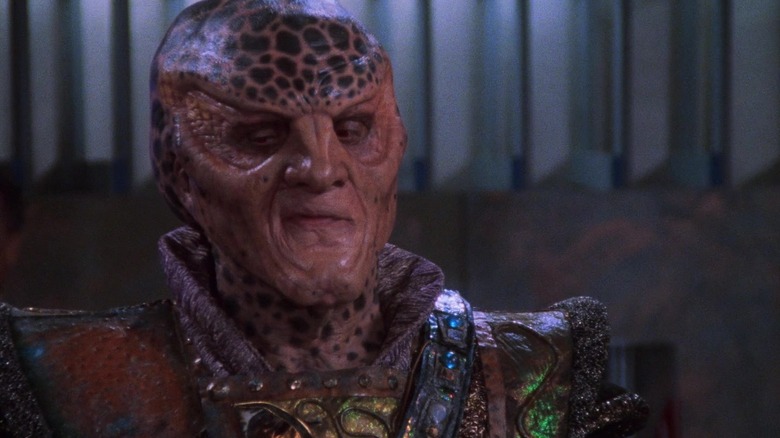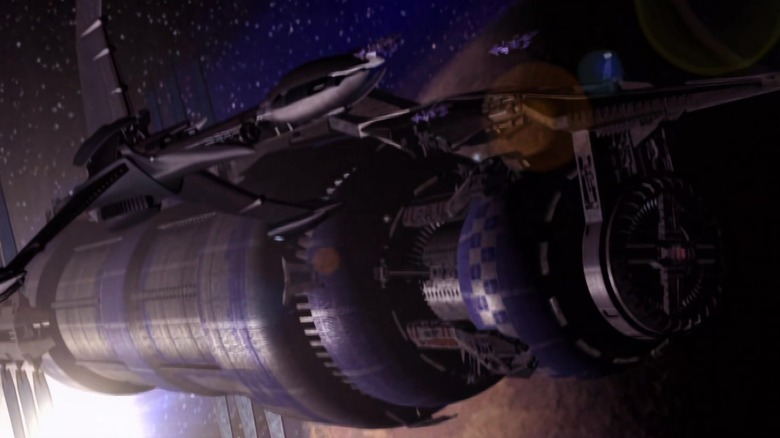The Correct Order To Watch The Babylon 5 Franchise
J. Michael Straczynski's "Babylon 5" began its life as a two-hour TV movie called "Babylon 5: The Gathering" which aired on February 22, 1993. There was some controversy about the series, however, as Straczynski pitched his space station series to Paramount as early as 1989. Paramount turned Straczynski down, and he took his series to Warner Bros., who approved. Suspiciously, only two months after Warner announced "Babylon 5," Paramount announced their own space station series, "Star Trek: Deep Space Nine." In a Tweet from 2018, Straczynski claimed that Paramount "put their show into high gear, spending four times what we did so they'd make it to air first." Indeed, "Deep Space Nine" first aired on January 3, 1999, beating "Babylon 5" by a month and a half. No legal action was taken against Paramount, but there has been a certain amount of bitterness ever since.
Additionally, the "Babylon 5" TV series didn't begin airing in earnest until late January of 1994, leaving a comfortable production gap between the two shows. Despite many similarities, "Babylon 5" and "Deep Space Nine" were just different enough to form their own unique fanbases. Also, because "Babylon 5" wasn't attached to a preexisting sci-fi franchise, it was free to expand its own universe and explore its own sprawling mythology. Indeed, there have been three "Babylon 5" TV shows, six TV movies, and, as of 2023, a straight-to-video feature.
Keeping track of the various "Babylons" might prove difficult, but we here at /Film are here to help. Here is a handy, clear list of the correct order of all the "Babylon" film media produced to date.
The release order
Here are all the movies and shows in the order of their release. The central TV series is broken up around the release of several TV movies, and the show will be marked in bold.
- "Babylon 5: The Gathering" (1993) – TV Movie
- "Babylon 5," seasons 1 through 4 (January 26, 1994 to October 27, 1997) – TV series
- "Babylon 5: In the Beginning" (January 4, 1998) – TV movie
- "Babylon 5," season 5, episodes 1 – 17 (January 21, 1998 to Jun 17, 1998) – TV series
- "Babylon 5: Thirdspace" (July 19, 1998) – TV movie
- "Babylon 5," season 5, episodes 18 and 19 (October 28, 1998 and November 4, 1998) – TV series
- "Babylon 5: The River of Souls" (November 8, 1998) – TV movie
- "Babylon 5," season 5, episodes 20 – 22 (November 11, 1998 – November 25, 1998)
- "Babylon 5: A Call to Arms" (1999) – TV movie
- "Crusade" (June 9 – September 1, 1999) – TV series
- "Babylon 5: The Legend of the Rangers: To Live and Die in Starlight" (January 19, 2002) – TV movie
- "Babylon 5: The Lost Tales" (2006) – Straight-to-video anthology special
- "Babylon 5: The Road Home" (2023) – Straight-to-video movie
And that list doesn't include the 22 "Babylon 5" novels, nor the many comic books or board games the series spawned. Straczynski has said that he also wanted to reboot the series, and is currently looking for a network willing to fund it.
The correct order is the mythology
It's important to work one's way through the Babylon series in the correct order, as the stories and characters are massively complicated, and by design. "Babylon 5" takes place on board the titular space station, constructed specifically to be diplomatic neutral ground in the wake of multiple devastating pan-galactic wars. Ships visit the station using wormhole-like "jump points," allowing everyone to visit Babylon 5 as they were able. Aliens snarl at each other, and humans, who run the station, attempt to keep the peace. The series centered on religious zealotry, post-war resentment, assassinations, psychic powers, and legitimate godlike prophecies.
One will have to familiarize themselves with the Drakh attack of the Shadow War, the Telepath War, the Earth Alliance Civil War, and the Independence of Mars. Unlike "Star Trek," "Babylon 5" never presented itself as a utopia, and was free to start wars and feature devious, fallible, wicked characters. The Earth Alliance is unlike the Federation. In many ways "Babylon 5" was the anti-"Star Trek," pointing out that utopian sci-fi was churlish and unrealistic. Humans (and aliens) may be able to travel the stars, but they'll be just as divided and petty as ever.
Yes, both "Babylon 5" and "Deep Space Nine" had wormholes near the title stations, and fans of both will be able to point out numerous parallels besides, but, as mentioned, they are indeed separate entities. It's worth noting that "Babylon 5" would eventually poach a few recognizable "Star Trek" actors, including Walter Koenig, who played Alfred Bester in 12 episodes of the show.


